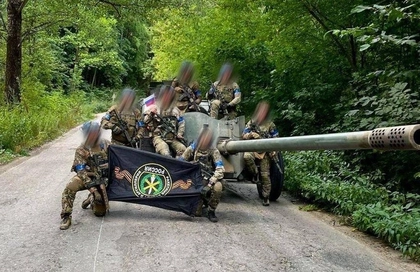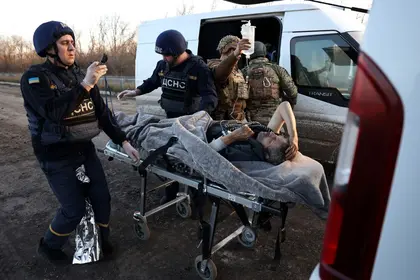Overview:
- Russians shell hospital and downtown Kherson, killing and injuring civilians
- UN human rights reviewers call out Russia for its war crimes and crackdowns
- November rains and mud slowed both aerial and ground maneuvers
- Ukrainian Soviet-era Buk-M1s adapted to fire US missiles
- AFU advances along the left bank of Dnipro, consolidating control
- Both sides continue to trade advances around Avdiivka
Three killed in Russian attack in Kherson; 12 injured, including a baby
Russian strikes targeting civilian areas of Kherson killed three civilians and injured at least 12 on Monday, the region’s governor, Oleksandr Prokudin said. A two-month-old infant was among those injured.
Explosives rained down on the city center in the afternoon, killing two adults and injuring at least ten people. (It wasn't immediately clear whether these were glide bombs or artillery shells.) Separately, air strikes struck a car in a suburban area where a mother was killed and her two-month-old baby was injured.
JOIN US ON TELEGRAM
Follow our coverage of the war on the @Kyivpost_official.
“Eight vehicles, including one ambulance, an administrative building, a hospital, and at least fifteen houses were destroyed or damaged,” Prokudin posted on Telegram.
The southern city has been a frequent target of Russian strikes, ever since Moscow’s troops retreated to the east bank of the Dnipro River earlier in the year, and have conducted operations from the other shore.
This two-month-old baby covered in blood — one more consequence of the shelling of 🇺🇦 Kherson. Baby's mother is in a bad condition. This happens in our cities daily because of brutal attacks of RF. We want to stop it. Children should see their families' smile, not hospital wards. pic.twitter.com/UsOqvhYsdO
— Olena Zelenska / Олена Зеленська (@ZelenskaUA) November 13, 2023
UN delegates rebuke Russia for “brutal war of aggression,” persecution of protesters
As part of a periodic review of the human rights records of United Nations member states, Moscow faced a firing line of Western criticism in Geneva on Monday. A faction of delegates ripped the Kremlin for jailing war protestors and journalists and for its “atrocities” in Ukraine.
“We condemn the Russian government’s brutal war of aggression against Ukraine and its almost complete domestic crackdown on dissent,” US Ambassador Michele Taylor announced to the assembly, AFP reported. “Impunity for the Kremlin’s human rights violations and abuses at home has directly enabled its aggression and atrocities abroad.”

Ukraine’s Elite Special Ops: Top Missions of 2024 – From Black Sea to Kursk
Each of the UN’s member states goes through a review of its human rights records about every four years.
AFP reported that, aside from vocal Western states, “few other countries even mentioned Ukraine, urging only small improvements to its domestic situation, while a number congratulated Russia for progress on rights issues.”
The usual suspects of Cuba, Venezuela and North Korea, as well as China, defended Russia’s actions at home.
British ambassador Simon Manley focused on Moscow’s forced deportation of Ukrainian children to Russia and called on the Kremlin to release its imprisoned political opponents. Ukraine’s delegation pleaded with the body to hold Russia accountable for its war crimes.
For his part, Russian Deputy Justice Minister Andrey Loginov admonished Moscow’s critics and said they should “not use human rights issues as a pretext for interference in the domestic affairs of other states.”
Operations: Kherson region
Ukrainian soldiers on the east bank of the Dnipro River advanced on Monday, the Institute for the Study of War (ISW) cited Russian sources as reporting, expanding their control south of the town of Krynky. Over the past month, the Armed Forces of Ukraine (AFU) have managed to hold on to the town two kilometers from the river bank, although some Russian bloggers are reporting that Russian units have pushed the Ukrainians out of some unspecified positions.
Moscow’s forces conducted air and artillery strikes against the west (right) bank on Monday, including civilian targets, as noted earlier. Ukraine’s Southern Operational Command said that Russia conducted four air strikes with 41 glide bombs against populated areas.
A Russian blogger claimed that troops are constantly conducting strikes against Ukrainian targets with TOS-1A thermobaric artillery systems as well as glide bombs.
Operations: Avdiivka
As fighting continues for control over both the coke plant and slag heap around Avdiivka, Russian bloggers contend that Ukraine now controls at least half of the coke-producing facility. Russian bloggers are also claiming that AFU forces have advanced to the railway station near Stepove and near the Tsarska Okhota restaurant immediately south of the city, while unsuccessfully attacking near Krasnohorivka (5 km north of Avdiivka).
Russian forces meanwhile made confirmed gains around Avdiivka on Monday and over the past few days. Geolocated footage published on Friday shows that Russian forces recently advanced to the eastern outskirts of Stepove (3 km north of town.)
🌐 Place: #Stepove
— WarArchive (@JagdBandera) November 10, 2023
🗓 Date: ~09.11.2023
🇺🇦 Unit: 47 OMBr
📌 Geolocation: 48.19723, 37.68497
📂 Description: Bradley works in the main caliber. FPV flies into the shelter of the Russians. Stepove village, Donetsk region.
Subscribe\Підпишись - https://t.co/dOAtdIe1d2@GeoConfirmed pic.twitter.com/IShU98fCx5
Muddy conditions slow things down on the battlefield
Both Ukrainian and Russian sources on the ground are reporting that the tempo of operations has been slowed down by rain and muddy conditions, the ISW noted.
Ukrainian Ground Forces Spokesperson Lieutenant Colonel Volodymyr Fityo said on Monday that rain and mud in the Donbas have slowed down ground maneuvers there. Over the weekend, Ukrainian 14th Mechanized Brigade Spokesperson Nadiya Zamryha had observed that fog and rain were slowing down the pace of attacks, and, interestingly, that falling leaves made it more difficult to camouflage equipment as well.
“When it’s foggy and rainy, it’s more difficult for aerial reconnaissance to see the enemy,” Zamryha said. “The same goes for the Russians. In such weather, there are fewer attacks. The leaves have already turned, so we have to pay a lot of attention to the camouflage of equipment and personnel. The Russian army does the same.”
A spokesperson for Ukraine’s Southern Operational Command, Captain First Rank Nataliya Humenyuk, reported that glide bombs have for the most part replaced traditional bombing in Russia’s jets sorties due to poor weather conditions.
Russian military bloggers also conceded that recent heavy rains led to reduced shelling, diminished drone operations and complicated offensive operations in the western parts of the Zaporizhzhia region.
Ukraine’s Soviet-era systems have been retrofitted to use American missiles
Air Force spokesman Yuriy Ihnat told NV Radio over the weekend that a test facility in the United States has successfully converted Ukraine’s Buk-M1s to fire American missiles.
He noted that eventually all of the nation’s Soviet-era systems will have to be replaced or retrofitted. Ukraine relies primarily on the Buk-M1 and the S-300 systems, both of which are only made in Russia.
You can also highlight the text and press Ctrl + Enter









